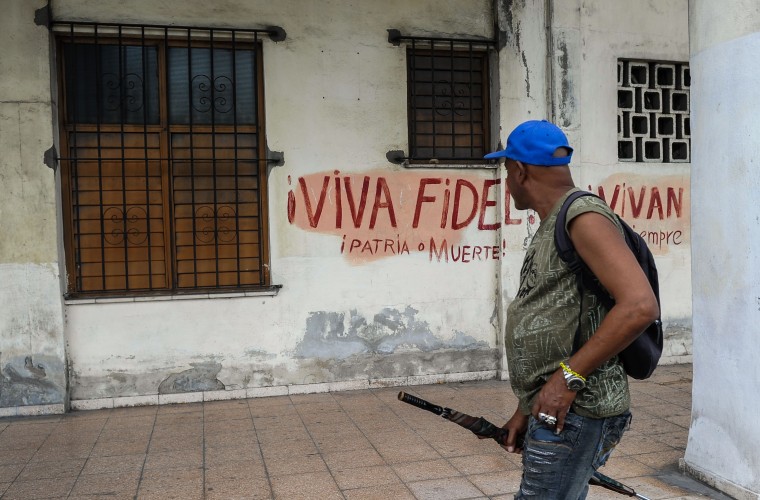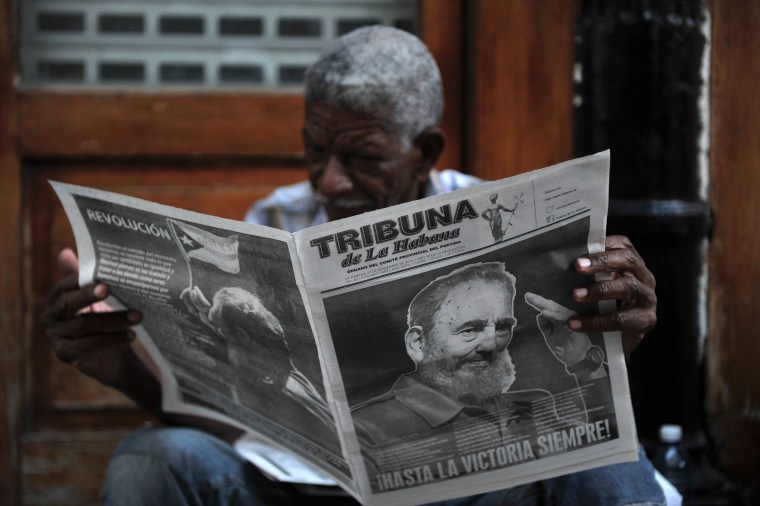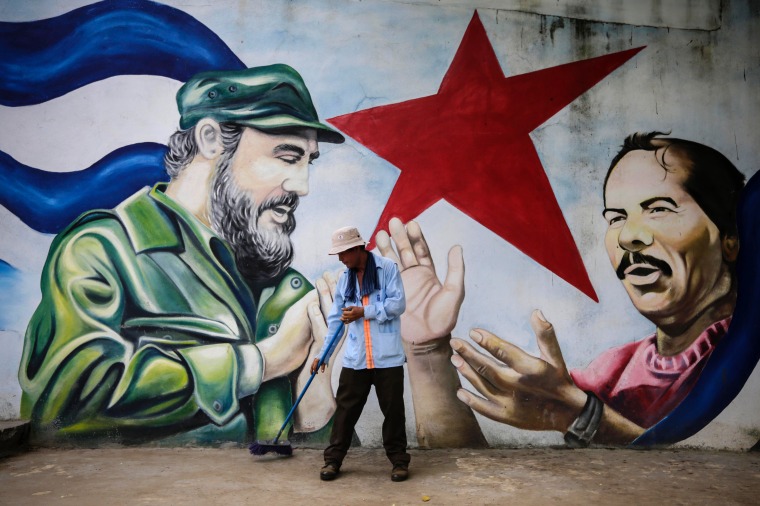NEW YORK — There are two dominant narratives of Fidel Castro: He's a nationalist symbol of triumph over the U.S.’s dominant influence and control over the Western Hemisphere, and he's a controlling autocrat who changed his island nation so drastically that his people are divided into cubanos and exiliados —with the latter group often charging him with creating a tyranny arguably worse than the one he tried to extinguish.
Assessing the impact of Castro and Fidelismo has provoked highly polarized polemics, but as the days pass, more nuanced views are likely to emerge. I think that the time we’re living in, filled with uncertainty, anxiety, and fits of rhetorical hate speech, demands as many perspectives on Castro and his legacy as possible, perhaps allowing us to re-construct a historical truth from crashing waves of fragmented perspectives.
As a New York-born son of Puerto Rican migrants who has appreciated Castro’s support for Puerto Rican independence — and seen the position of the island oscillate back and forth from favored colony to debt-ridden territory — my reaction to Fidel’s death is one of tempered sadness, not only for his passing, but what could have been. As I acknowledge the many denunciations of his often harsh control over dissenters, I have also seen deep sadness in the eyes of the son of Carlos Muñiz Varela, a Cuban-born activist raised in Puerto Rico who was murdered in the town of Bayamón in 1979 by an anti-Castro group called Comando Zero.
RELATED: On Fidel's Death, Cuba and Puerto Rico, Two Paths Intertwined
I'm not so much interested in taking issue with rabid anti-Castro Cubans and Latin Americans — who may have ironically had a significant hand in electing our despotic president-elect — but offering a critique of his legacy, revolutionary Cuba from the intersectional left.
Fidel’s unlikely emergence as leader of a revolutionary force that swept into Cuba’s major cities from the Sierra Maestra Mountains, a bearded and arrogant disciple of José Martí, the prophet of Nuestra América, was an astonishing fusion of style and substance that would define Latin American resistance for half a century. Together with his Argentine comrade Che Guevara, Castro staked a claim to Cuban sovereignty that would stand in defiance of the U.S.’s pattern of exerting control over Latin American nations through the use of caudillo proxies, Mafioso hoteliers, and banana republics.
Many passionate believers who fought with Castro were ultimately dismayed by his turn to Marxism-Leninism soon after his forces ousted US-friendly dictator Fulgencio Batista. But Fidel’s move to Communism was an audacious assertion that Cuba could push the boundaries of the European debate over this radical solution to wealth inequality.
RELATED: Cuba after Castro: How Much Change, and How Quickly?
By spotlighting Cuba’s plight as a peripheral economy of the global south, Fidel’s revolution was intent on creating a new, forward-thinking society that had for half a century been co-opted by US interests as a free trade zone for capital investment and tourist debauchery.
Castro’s unapologetic intransigence was intoxicating to Latin Americans and Latin@s who yearned for a true independence and bristled at the hypocrisy of the US’s cloaked colonialism. This earned him active hostility in the form of multiple overt and covert attacks from U.S. intelligence agencies and anti-Castro Cubans, and most damagingly, the still existing trade embargo.

While we’ll never know if some, perhaps modified form of socialism could have succeeded in Cuba if the U.S. had decided to take a more liberal tack in its relations with Cuba, the embargo sealed the island’s fate in terms of Castro’s one-party autocracy, state-controlled media, arbitrary arrests of political dissidents, and the persistent peer-pressuring of the committees for the defense of the revolution.
It was in the defense of Cuba’s economic independence that Castro created the conditions for the stagnant industry, crumbling infrastructure and widespread shortages of commodities that still afflict the island’s residents today. If Cuba couldn’t trade with the US, well, according to Fidel, it didn’t need to, and it couldn’t afford any open-market influences for fear of corrupting those of failing faith.
The brilliant humanity of Castro’s welfare state — its dedication to health care, its striving for universal literacy, its low child mortality rates — was ultimately a product of Fidelismo’s benevolent yet controlling patriarchal bubble. A revolutionary society plagued by scarcity could only be sustained by unflagging commitment from a state that demanded absolute loyalty.

Castro’s acceptance or rejection by different elements of the greater Cuban community resembles that of members of a nuclear family with a strong father figure. Some saw a caring and courageous benefactor, others a suffocating tyrant. Through the lens of Latin America’s complicated view of race, he represented a typical Latin@ assertion: our mixed-race reality makes us natural anti-racists.
A lighter-skinned Cuban from a privileged background, Castro’s insistence on eliminating social class differences drove most of the island’s lighter-skinned elite and middle class to South Florida in the early years of the revolution and elevated the stature of the Afro-Cuban majority. In this way, he followed Martí’s vision that Cuba must recognize its strength as an Afro- and indigenous-rooted nation.
Yet for all of Castro’s embrace of African liberation movements and his rapport with leaders from Nelson Mandela to Malcolm X, there are few if any significant Afro-Cubans in prominent political positions on the island. And though the liberation of women has long been touted, the emergence of Josefina Vidal as Director of the North American Department of Cuba's Foreign Ministry seemed long overdue. The leadership role of Castro’s granddaughter Mariel as an activist for LGBTQ rights is encouraging but does not erase the years of previous persecution of this marginalized group in the past.
RELATED: Op-Ed: In the U.S., We Rebuilt What Fidel Destroyed
As far as human rights are concerned, it’s only fair that criticisms of the worst excesses of Castro’s regime — characterized as persistent, although not exactly horrific by a recent Human Rights Watch report — be accompanied by a recognition that most democracies in the “free world” have political prisoners and some level of persecution of dissidents.
It’s particularly hard for the U.S., accused of violating international law by denying suspected terrorists due process and in fact torturing them in its Guantánamo prison — that sits on occupied Cuban territory — to take much of a moral high ground in such a debate.
As much celebrating as there was in Little Havana on Friday night, it remains to be seen what real significance Castro’s death will have on Cuba’s future. The economic reforms begun by Raúl will most likely proceed at a possibly accelerated pace, but they are still designed to leave socialism intact.
There is no indication, particularly with a Trump presidency that the embargo will be lifted at any time soon. And as much as there is continued discontent and risky attempts at emigration by Cuban residents, regime change on the island seems unlikely.
The passing of Fidel has provoked strong opinions across a broad political spectrum, and a great deal of human, emotional reaction.
Yet it seems Fidel’s ability to change the world passed away a long time ago, and all we’re left with is the slowly vanishing image of that handsome, bearded man holding a cigar, using his oratory brilliance to keep the revolutionary imagination from disappearing. My hope is that Cuba will ultimately, on its own terms, hold onto its dream of liberation.
Ed Morales is a freelance writer for The Nation and other publications. Based in New York, he teaches at Columbia University’s Center for the Study of Ethnicity and Race. He co-directed a documentary, Whose Barrio?, about the gentrification of East Harlem.
